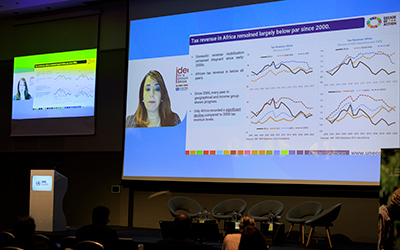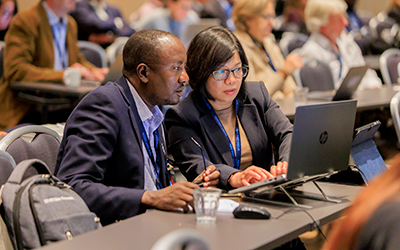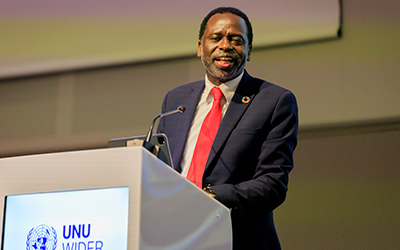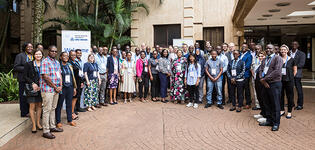Blog
Lessons for tax policy from the WIDER Development Conference in Oslo
The annual WIDER Development Conference held this year in Oslo concentrated on domestic revenue mobilization (DRM). The 2.5-day hybrid event emphasized both the progress made and unresolved problems in increasing economic autonomy and improving development prospects in the Global South.

The conference launched with a fascinating keynote from Dr Hanan Morsy, Deputy Executive Director and Chief Economist of United Nations Economic Commission for Africa (UNECA). In her keynote, Morsy stressed the importance of African capacity to raise more revenues.
Global, exogenous factors—such as higher borrowing costs, widening yield spreads on sovereign bonds that increase debt servicing costs, and a rise of populist governments in donor countries which is jeopardizing foreign aid budgets—are contributing to the increased focus on revenue mobilization in Africa. The role of domestic factors, such as prevalent tax exemptions and the susceptibility to illicit financial flows, cannot be ignored when developing tax capacity on the continent.
The conference hosted three policy panels and 20 parallel sessions. Discussions ranged from the importance of effective use of oil and gas revenues to the resilience of tax-benefit systems during COVID-19 and from state capacity and social contracts to the importance of tax administration data and collaboration between revenue authorities.
Here, I discuss three interconnected challenges for tax policy and resource mobilization, gleaned from the various sessions.
Tax avoidance, evasion, and havens
Discussions on tax avoidance and what to do about it were ubiquitous throughout the conference. Offshore tax havens contribute significantly to global tax evasion and avoidance, with a significant proportion of global multinational enterprises’ (MNEs) profits shifted to havens. According to the estimates of a UNU-WIDER study, the shifting of corporate profits to offshore havens costs the world’s governments EUR 250 billion in public revenues a year.
Recent research also shows that offshore tax havens not only provide MNEs with opportunities to minimize taxes, but also with a ‘politics of the invisible’ to secure preferential tax policies from national governments. That is, the obscure nature of offshore financial centres enables multinationals to access better tax treatment compared to domestic competitors, such as tax incentives and lower effective tax rates.
Offshore tax evasion is common, with Argentina revealing assets worth 21% of GDP held abroad and Dubai showing that 27% of its real estate is owned by foreign nationals. These numbers are staggering and point to both significant amounts of lost revenue and a chronic lack of compliance which undermines the concept of tax progressivity—paying taxes according to earning power.

Professor Niels Johannesen from the University of Copenhagen confirmed in his keynote lecture that offshore assets are extremely concentrated at the top of the wealth distribution and a large share of those assets are significantly tax non-compliant.
Initiatives to countervail the impact of tax avoidance and offshore tax evasion have met with varying degrees of success. The global minimum tax, for example, will reduce the attractiveness of profit shifting and the pressure on countries to offer tax incentives to keep or attract foreign investment, though the investment effects may be minimal. Increased country-by-country reporting also helps to reduce profit shifting and improve the tax base for fiscally constrained countries.
Increased cross-border exchange of information can have a galvanizing impact by revealing tax cheats but the prospects for enforcement of tax rules and recouping lost revenues depend on administrative capacity. There is a need for revenue authorities to continue developing their technical and administrative expertise.
State capacity and social contracts
There can be no discussion about taxation without dwelling on the overarching role of the state. The fiscal exchange hypothesis argues that the state requires its citizens to be tax compliant and in return, the state responds by providing goods and services to citizens. In this process, the state may become more accountable to its citizens. A recently published Journal Special Issue on the development of fiscal state capacity delves deeper into this issue.
 One issue is that so-called unearned income—natural resource rents, for example—may undermine this fiscal social contract between the state and its citizens, thereby reducing state accountability. But while unearned income may weaken the social contract, strong and accountable government institutions can placate this negative effect.
One issue is that so-called unearned income—natural resource rents, for example—may undermine this fiscal social contract between the state and its citizens, thereby reducing state accountability. But while unearned income may weaken the social contract, strong and accountable government institutions can placate this negative effect.
There are also situations, particularly during violent conflicts, where the state is not the primary or sole provider of essential goods and services. Do armed groups have the potential to become more legitimate governments that can collect taxes and provide basic public goods in a credible manner? The conference featured an interesting session with insights on this issue, which is fairly new on the tax research agenda.
Revenue administration, research, and policy in sub-Saharan Africa
A plethora of factors contribute to low revenue mobilization in sub-Saharan Africa, one important component being the lack of tax compliance. In the first day’s panel discussion, Milly Nalukwago from the Bank of Uganda reminded that her country increased tax registrations by 800,000 persons in a single campaign over six months. Nalukwago added that progress is happening, but more collaboration is needed to find a path out of aid dependency.

The conference wrapped up with a rousing speech from UNU Rector, Professor Tshilidzi Marwala. He emphasized that while the COVID-19 pandemic reversed gains made towards the Sustainable Development Goals, raising domestic revenue to finance development needs is a surefire way to get back on track.
Our successful foray into Oslo closed with the signing of a new agreement with the Norwegian Agency for Development Cooperation to continue supporting UNU-WIDER’s research and capacity development programme on domestic revenue mobilization. We are looking forward to more exciting research findings, expanding our networks, and supporting development policy.
The views expressed in this piece are those of the author(s), and do not necessarily reflect the views of the Institute or the United Nations University, nor the programme/project donors.
 Join the network
Join the network








